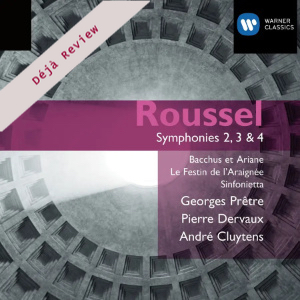
Déjà Review: this review was first published in January 2007 and the recording is still available.
Albert Roussel (1868-1937)
Contents listed after review
Orchestre National de France/Georges Prêtre ⁴ ⁶
Orchestre Colonne/Pierre Dervaux ¹
Orchestre de la Societe des Concerts du Conservatoire/Andre Cluytens ² ³ ⁵
rec. 1963 ⁵, 1965 ² ³, 1981 ¹ and 1984 ⁴ ⁶, Salle Wagram, Paris
Reviewed as EMI Classics Gemini 3 71487 2
Warner Classics 3 71487 2 [2 CDs: 151]
Three French conductors tackle Roussel with three French orchestras. Cluytens (1905-1967) undertakes Symphonies 3 and 4 as well as the Sinfonietta. Symphony No 2 falls to Pierre Dervaux (1917-1992) and Prêtre (1924-2017) deals with Bacchus et Ariane and Le Festin de L’Araignee. Some of these recordings are now over forty years old, so conjoining them in an EMI Gemini twofer means that the middle-aged jostles with the relative youth (1981 vintage) of the Dervaux recording and the positively adolescent Pretre (1984).
It’s appropriate then to start with Dervaux’s Second Symphony. Better sounding than the 1968 Martinon recording, this takes a broadly similar approach, though Pretre is somewhat more relaxed in the opening movement. Some here will miss Martinon’s decidedly more tactile and tensile approach – he’s that much more graphic than Pretre – though the lightly sprung anime section is certainly splendidly cultivated in the EMI recording. The central movement’s Lent goes equally well with suitable vehemence later. The engineers well capture low brass and martial and declamatory instincts. It’s not a performance that quite, for me, displaces Martinon (Erato 25654 60577-2) though it is highly successful and is no disappointment.
The Sinfonietta and Third and Fourth Symphonies are in the eloquent hands of Cluytens. He’s very strong on contrastive material in this repertoire and has a sure ear for sectional balance. Though he sometimes moves at quite a lick, it’s never too fast for proper clarity of articulation – note the passages for flutes in the first movement of No 3 in this respect. The sense of lissome and serene is one that runs throughout Cluytens’ readings of all three scores. Once past the opening Lento of No 4 the agitated Allegro that follows is just that – a sure study in emotive states fully realised by a conductor in full control of every facet of the score. The climax of the slow movement is built with inexorable power. Dynamics are perfectly graded. Strings are warm, winds pipey and pithy. The Sinfonietta was written for Jane Evrard’s women’s orchestra. The refined post-Wagnerianism is allied to baroque tints and a fine sense of string weight. Complication arises because these three performances are also on Testament SBT 1239 where they’re coupled with Cluytens’ recording of the Suite No 2 from Bacchus et Ariane. EMI’s twofer has recordings of both suites, though with Prêtre, not Cluytens.
Those seeking extra thrills – and spills – will want to know that Charles Munch’s vintage 1965 recordings of the Third and Fourth Symphonies are on Warner Elatus 0927 46730-2. They’re full of the most intense excitement and drama but there are orchestral weaknesses throughout. Munch wasn’t able to bring on board the Lamoureux orchestra in quite the same way that Cluytens did the Orchestre de la Societe des Concerts du Conservatoire. This last was an often intransigent and awkward beast, but when it was reconciled to a conductor it turned up for work, as here.
Bacchus et Ariane is a fine performance, though not quite so well recorded. The full sound spectrum isn’t really embraced, though the playing and direction have character and bite and a great deal of drama. The strings are appositely lean and the Stravinskian inheritance is unselfconsciously evoked.
This is very much more than a Roussel starter pack. The performances are a little variable and the recording dates very much so. But the Cluytens-Prêtre team is formidable and allied to the lesser known but still ardent Dervaux you have as incisive a trio of conductors as you could wish at this price range. Those visiting this vintage must also have Martinon and Munch and then they really will have a quintet of conductorial Rousselians to brag about.
Jonathan Woolf
Buying this recording via a link below generates revenue for MWI, which helps the site remain free


Contents:
Symphony No 2 in B-flat major, Op 23 (1919-21) ¹
Symphony No 3 in G minor, Op 42 (1929) ²
Symphony No 4 in A major, Op 53 (1933) ³
Le Festin de L’Araignee, Op 17 (1912) – excerpts ⁴
Sinfonietta for string orchestra, Op 52 (1934) ⁵
Bacchus et Ariane, Op 43, Suites No 1 and No 2 (1930-31) ⁶

















